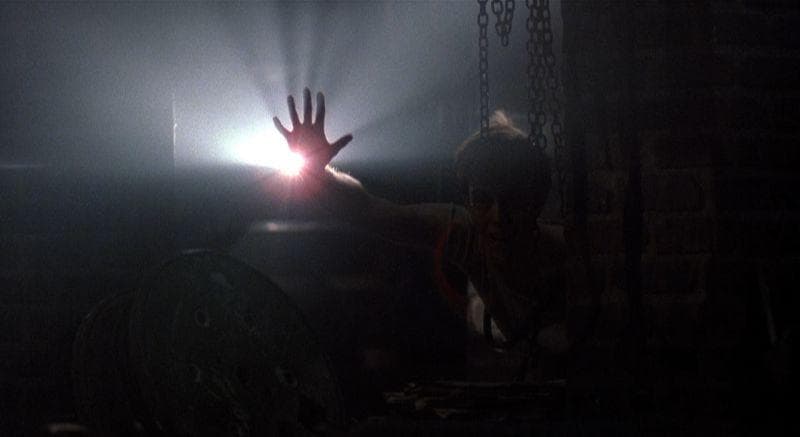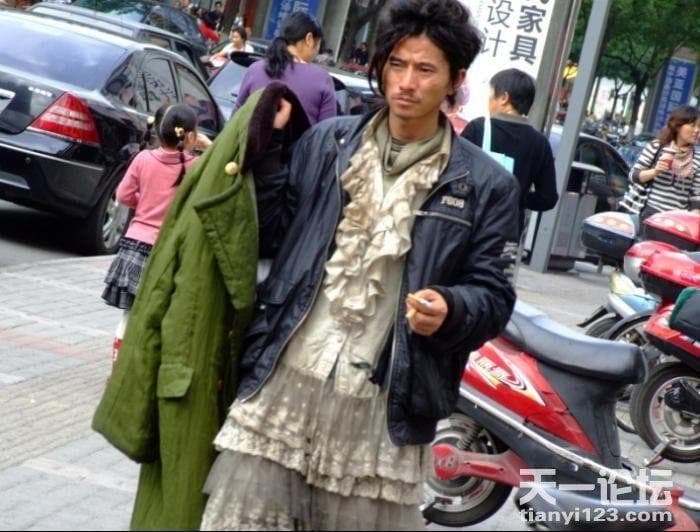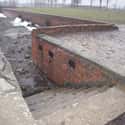-

(#13) Nazis Offered Internees Easy Jobs To Grant False Hope Before Murdering Them While Laughing
Premsyl Dobias was a member of the Czech Resistance who was arrested and sent to Mauthausen. He survived, emigrated to Great Britain, and subsequently related his experiences there to the British Imperial War Museum's digital archive.
One story is particularly disturbing:
The SS told us in German that they needed some prisoners who knew... who were from the farm, who knew how to feed pigs, and they would then come every day from the camp direct to that farm to look after the pigs. Obviously, everybody wanted to get away from the hard work in the camp and there were - all of them were volunteers.
The SS told us he had to have only those who were from a farm and who knew... who spoke German. That eliminated a few Spaniards who were in the group, but we were mostly Czechs, and even some Czechs didn’t know German. So finally the SS guard selected about, oh, 20 prisoners, lined them up, and I overheard the other one telling him: "Du hast zu viele" - you have too many.
So he started to push back a few, he pushed back two Spaniards, then he came to me, he pushed me back, and I was hoping so much to be able to be working on a farm, I was so hungry I hoped that I could actually eat with the pigs. So I came forward and in German, at attention, I told him that I was born on a farm and all I did all my life was feeding pigs - of course it was not true. But he very cruelly kicked me, I still have the mark on my leg, and pushed me back.
When he had finally selected about a dozen, I believe dozen to fifteen, he told them: "turn right, without step walk to that farm." And both of them remained behind the group which was marching very happily to the farm. That part of the camp was separated by guards and the guards had machine-guns to guard the outlines of the camp. We were very upset that we were left behind, and looked with envy at those who were marching to that farm.
But suddenly we heard machine-gun shooting from two sides and with horror we noticed that all the prisoners who were marching to that farm crossed the so-called border and were gunned down dead. I could have been one of them. Then the SS turned back, laughingly came back to our Kommando, we again stood at attention and one of them laughingly said "who else knows how to feed pigs?"
That is an experience which will haunt me all my life.
It’s a tremendous nightmare, to such an extent, that I could have never believed that a nation, civilized nation, which gave the world musicians, poets, experts in every field of science, how they could have been fooled by a maniac like Hitler is something which I will never understand.
-
(#4) Zyklon B Took 10 To 12 Minutes To Do Its Job, During Which Nazis Stood Around Waiting
The Sonderkommando were present at all times during the gassing process, frequently conversing with the victims in their native languages. Shlomo Venezia described what unfolded once the victims undressed and were bolted into the chamber behind a hermetically sealed door:
Once they had taken off their clothes, the women went into the gas chamber and waited, thinking that they were in a shower, with the shower heads hanging over them. They couldn’t know where they really were. A woman would sometimes be seized by doubt when no water came out and went to see one of the two Germans outside the door. She was immediately beaten and forced to go back in; that took away any desire she might have to ask questions.
Then the men, too, were finally pushed into the gas chamber, the Germans thought that if they made thirty or so strong men go in last, they would be able, with their force, to push the others right in. And indeed, herded by the rain of blows as if they were so many animals, their only option was to push hard to get into the room to avoid the beating.
That’s why I think that many of them were dead or dying even before the gas was released. The German whose job it was to control the whole process often enjoyed making these people, who were about to die, suffer a bit more. While waiting for the arrival of the SS man who was going to release the gas, he amused himself by switching the light on and off to frighten them a little bit more.
When he switched off the light, you could hear a different sound emerging from the gas chamber; the people seemed to be suffocating with anguish, they’d realized they were going to die. Then he’d switch the light back on and you heard a sort of sigh of relief, as if the people thought the operation had been canceled.
Then, finally, the German bringing the gas would arrive, it took two prisoners from the Sonderkommando to help him lift up the external trapdoor, above the gas chamber, then he introduced Zyklon B through the opening. The lid was made of very heavy cement. The German would never have bothered to lift it up himself, as it needed two of us.
Sometimes, it was me, sometimes others. I’ve never said this before, since it’s painful to admit that we had to lift the lid and put it back, once the gas had been introduced. But that’s how it was.
Once the gas had been thrown in, it lasted about ten to twelve minutes, then finally you couldn’t hear anything, not a living soul. A German came to check that everyone was really dead by looking through a peephole placed in the thick door - it had iron bars on the inside to prevent the victims from trying to smash the glass.
-
(#12) Chemist Primo Levi Was Spared Death By His Skills But Witnessed Countless Horrors
Surviving the initial selection process at Auschwitz merely qualified a prisoner to be assigned to extremely harsh conditions involving back-breaking labor and intentionally miniscule amounts of nourishment.
Primo Levi was a Jewish Italian chemist and eventual memoirist who was assigned to the Auschwitz-Monowitz labor camp, a satellite camp of Auschwitz that manufactured synthetic rubber. He arrived in February 1944 with 650 other Italian Jews, only 20 of whom survived. Because he was a chemist, he was of use in the camp laboratory, where he also managed to surreptitiously acquire additional food. Thus he avoided the hard labor and freezing climate that deliberately doomed most of the other inmates within 90 days.
During periodic selections, prisoners were forced to strip naked. Those deemed too exhausted or sick to provide meaningful labor were designated for transport to Auschwitz-Birkenau and the gas chamber. Unlike newer prisoners, they knew exactly what awaited them. Levi's description of this process from his work The Drowned and the Saved explains how most were already too mentally defeated and humiliated to resist:
The day in the [camp] was studded with innumerable harsh strippings - checking for lice, searching one’s clothes, examining for scabies and then the morning wash-up - as well as for the periodic selections, during which a "commission" decided who was still fit for work and who, on the contrary, was marked for elimination. Now a naked and barefoot man feels that all his nerves and tendons are severed: He is helpless prey. Clothes, even the foul clothes distributed, even the crude clogs with their wooden soles, are a tenuous but indispensable defense. Anyone who does not have them no longer perceives himself as a human being but rather as a worm: naked, slow, ignoble, prone on the ground. He knows that he can be crushed at any moment.
Primo Levi perished in 1987 after a fall from a three-story building. Whether his death was a suicide or an accident is still a matter of debate within the literary community.
-
(#16) As The Russians Closed In, The Nazis Forwarded Mail From Auschwitz To Other Camps
Alec Ossowski was sent to Auschwitz in August 1943 for Resistance activity. A non-Jew, he was not subject to selection, and was imprisoned in Auschwitz I, the forced labor camp. His treatment was harsh, but not as brutal as the treatment meted out to Jews in the extermination camp, Auschwitz-Birkenau. Alec was sent to Buchenwald when the Germans began evacuating prisoners to the West. There, he received a letter that was mailed to him at Auschwitz:
They evacuate us, a letter comes for me to Auschwitz. The bloody Russians are coming, but no, the German postal service cross out Auschwitz and send the letter on to me in Buchenwald. Can you imagine that? I had a new number, so they even have to work out what my number had been changed to in order to send it on to me. Strange nation.
Alec met his eventual wife Maria in a transit camp in the British sector of Germany. From there, they emigrated to Great Britain and opened a successful antique business that their sons continued to operate.
-
(#1) The Four-Day Train Ride To Auschwitz, During Which 80 People Rode In Each Cattle Car
When the Nazis decided Auschwitz would serve as the focal point for the extermination of Jews and various other groups, they were faced with the logistics of transporting millions of people to southern Poland, some from as far away as the Netherlands, France, Italy, and Greece. Transportation was done by railroad, typically in cattle cars, but occasionally in passenger trains, in which wealthy Jews were encouraged to bring as much of their wealth with them as possible.
A typical journey is described in the book Perfidy, written by Ben Hecht and compiled from transcripts of the trial of Rudolf Kastner, a Hungarian Jew tried for collaboration with the Nazis in Hungary:
The Jews are deported to Auschwitz daily, on schedule. They leave from the ghetto embarkation depots, on schedule. Conductors signal, "All aboard." Brakemen wave lanterns. German and Hungarian guards shoot a few reluctant travelers, club and bayonet a last group of mothers into the compartments. The engineer opens his throttle. And the train is off for Auschwitz, on schedule.
Eighty Jews ride in every compartment. Eichmann [said] the Germans could do better where there were more children. Then they could jam 120 into each train room. But 80 is no reflection on German efficiency.
The 80 Jews must stand all the way to Auschwitz with their hands raised in the air, so as to make room for the maximum of passengers.
There are two buckets in each compartment. One contains water. The other is for use as a toilet, to be shoved by foot, if possible, from user to user.
I wonder here, why the water and toilet buckets? One water bucket, one toilet bucket for 80 despairing men, women and children plastered against each other as in a packing case, and riding to death. Why? One water bucket, one toilet bucket are not enough to relieve the misery of these barely living ones. Jammed together, how can they use any buckets? They must urinate and defecate in their clothes. They must continue to burn with thirst until they arrive at the gas ovens. But the buckets are there.
These transports typically took four days to reach Auschwitz. One infamous transport from the Greek island of Corfu took 18 days. Upon arrival, all of its inhabitants were dead.
-
(#18) Prisoners At Bergen-Belsen Were Forced To Haul Carts Of Corpses
Doriane Kurz was 4 years old in 1940, when her family fled Austria for Amsterdam. Later that year, the Nazis occupied Holland. Kurz's father was sent to Auschwitz, where he perished. Her mother was also taken, and she and her brother hid with gentiles before being discovered and taken. They were reunited with their mother at Bergen-Belsen, where Doriane witnessed the following scene of prisoners hauling corpses:
There were wagons... open wagons like, like carts, like the back of a horse and cart, open wagons, that were dragged along without horses. There were people pulling them. And they had corpses in them. And the corpses were lying in all directions and heaped on top of each other and there were many people who died every night and they didn't make it out to Appell but they were accounted for by being bodies and so after the grownups were marched out the... there was a squadron of people that pulled this wagon around and came into the barracks and took the corpses, and then they would, two of them would take the corpse, one at the feet and one at the hands and they would toss them up to the top of the heap and that happened every day. I still have trouble with that.
New Random Displays Display All By Ranking
About This Tool
Our data comes from Ranker, If you want to participate in the ranking of items displayed on this page, please click here.















